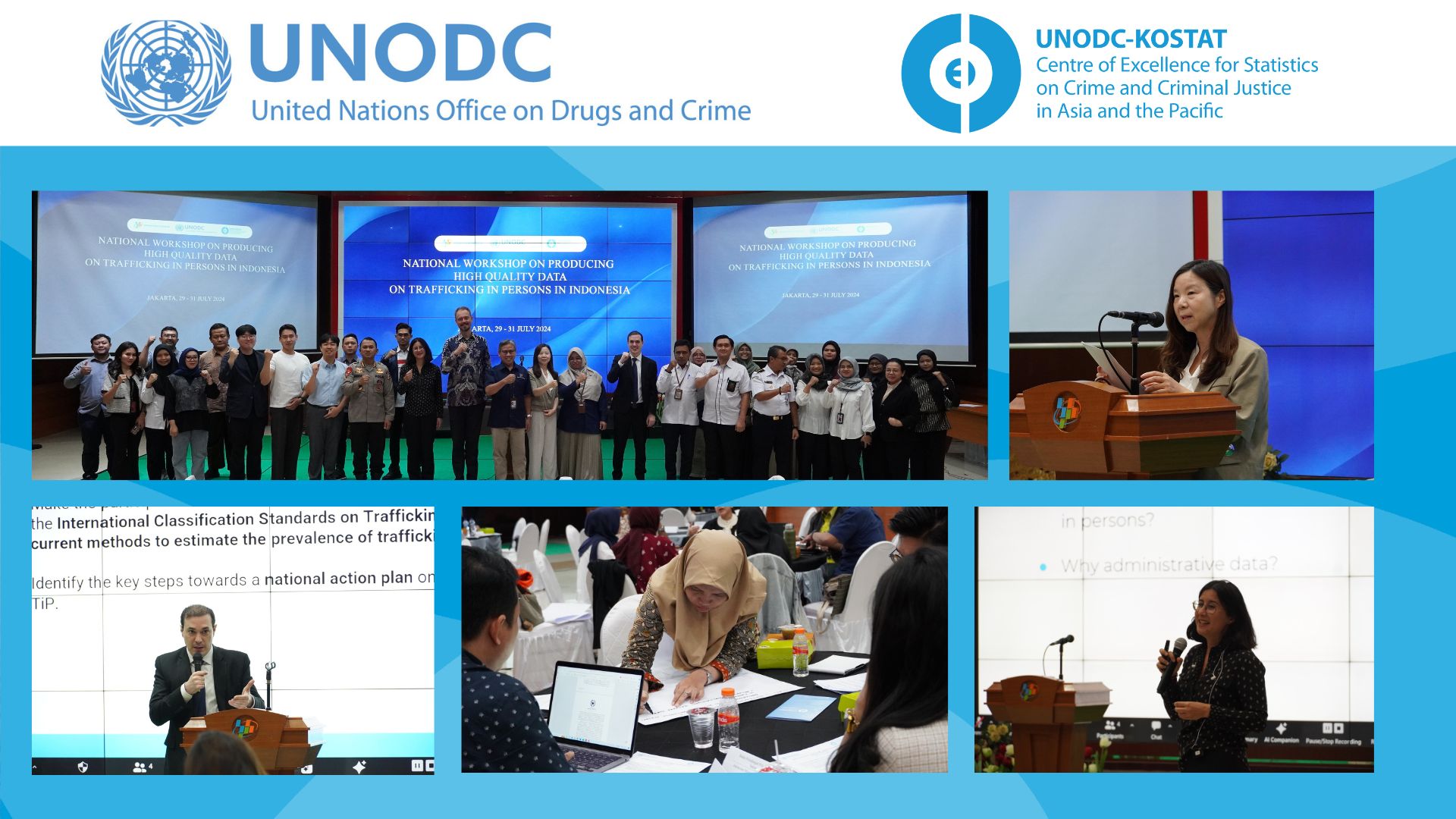
Jakarta (Indonesia), 29 July - 02 August 2024 – As custodian of the Protocol to Prevent, Suppress and Punish Trafficking in Persons, Especially Women and Children, UNODC is mandated to support countries in measuring their progress towards the achievement of Sustainable Development Goal (SDG) indicator 16.2.2 ‘Number of victims of human trafficking per 100,000 population, by sex, age and form of exploitation’. As the Republic of Indonesia has signed and ratified to the UN Trafficking Protocol, producing high-quality data on trafficking in persons is a crucial next step to ensure the SDG reporting and the fulfilment of the Protocol’s objectives.
Following up the kick-off meeting on Producing High-Quality Data on Trafficking in Persons held on 27 May, a national workshop was organized from 29 to 31 July, in partnership with Statistics Indonesia (Badan Pusat Statistik, BPS), in Jakarta, Indonesia.
A total of 63 representatives from 17 data-producing institutions on trafficking in persons participated in the workshop, including law enforcement agencies, the Ministry of Foreign Affairs, the Indonesian Financial Transaction Reports and Analysis Center, the National Statistical Office, the Indonesia Migrant Workers Union, and the University of Indonesia. The participants actively engaged in the workshop and demonstrated a strong commitment to improve the quality of data related to trafficking in persons in coordination with the Anti Trafficking National Task Force. The workshop was delivered by Giulia Serio, Research Officer of UNODC Headquarter and David Ravaux, Methodology Officer of the CoE.
The first day of the workshop started with welcoming remarks from Erik Van der Veen, Head of UNODC Indonesia Office and Ateng Hartono, Deputy of Social Statistics of BPS-Statistics Indonesia, and Jonghee Choi, Coordinator of the CoE, where the milestones of the project were highlighted. UNODC then presented the administrative data as crucial for understanding and addressing trafficking in persons because it provides detailed information to help identify at-risk populations, track trends, and evaluate the effectiveness of policies and interventions. After sharing the findings of the data availability assessment, UNODC delivered a presentation on the International Classification Standard for Administrative Data on Trafficking in Persons (ICS-TIP), an instrument used to facilitate the production and dissemination of high-quality administrative data related to the crime of trafficking in persons.
On the second day, data governance, the process of establishing the roles and rules for how data are to be managed, was presented to the audience. Moreover, an action plan was outlined by the participants in order to implement the ICS-TIP in Indonesia. The participants highlighted the need for implementing a survey to measure the prevalence of trafficking in persons in order to complement the currently available administrative data.
The last day focused on making the participants familiar with the methods used to estimate the prevalence rate of trafficking in persons, i.e., the survey and non-survey methods such as the Multiple System Estimation. The Project “Standard Tool for Analyzing Trafficking in Persons (STATIP)” was presented as an instrument to develop standardized survey tools to estimate the prevalence of trafficking in persons for the purpose of forced labour. Finally, the International Labour Organization (ILO) shared its experience in conducting a survey on decent work in marine fishing in Indonesia, which will be finalized by October 2024.
Following the workshop, the CoE visited relevant national institutions to prepare the grounds for implementing a survey to estimate the prevalence of forced labour under the STATIP project, which is aimed at developing a single set of tools allowing for the measurement of trafficking in persons (as per the United Nations Protocol on Trafficking in Persons) and forced labour (as per the ILO 1930 Convention No.29). This collaborative effort will pave the way for a comprehensive and coordinated approach to addressing and mitigating forced labour in Indonesia.
Further information on the CoE can be found here, Twitter @CoE_UNODC and Facebook @UNODC.KOSTAT.CoE.